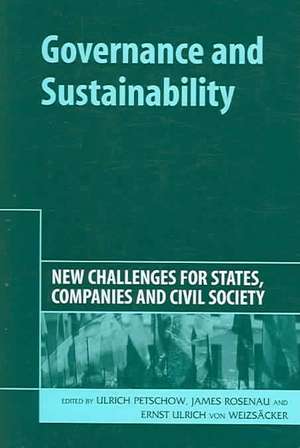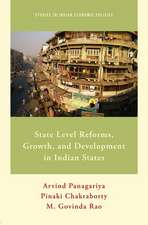Governance and Sustainability: New Challenges for States, Companies and Civil Society
Editat de Ulrich Petschow, James Rosenau, Ernst Ulrich von Weizsäckeren Limba Engleză Hardback – dec 2005
But these are changing times. With growing tensions over both globalization and regionalization, traditional systems of regulation are being subjected to growing pressure for reform. While states will continue to play a significant, if changed, role in the future, the importance of players from business and civil society is increasing. Sustainable development requires this change. Such an intra- and intergenerational concept cannot be achieved with a top-down approach, but rather needs the participation of all. In fact, the governance of sustainable development requires the exploration of new forms of both social co-operation and confrontation. By doing so, the different levels (global and local), players (state, company and civil society), control structures (hierarchy, market and public-private) and fields of action need to be taken into consideration.Governance and Sustainability examines the possibilities of integrating the environmental, social and economic dimensions of sustainable development within the framework of governance processes and how that might steer societies towards sustainability. It takes a close look at the key actors, their agendas and methods, forms of organization, problems and limits, as well as real-life examples for governance in different areas of society at the regional, national and international level. It is especially interested in exploring the nature of changes in the context of governance; the role of actors in such processes; and analysing how different forms of societal learning can improve governance processes. It concludes that this is a continuous process, characterized by conflicts and learning processes necessary to heighten both awareness of the complexity of the social and environmental problems faced and the prospects of implementing successful solutions.
Based on a major conference hosted to assess the issue of governance post-Johannesburg, the book includes innovative insights from some of the leading thinkers in both sustainable development and governance from academia, business, multilateral organizations and NGOs. It provides a unique perspective on two of the key societal problems facing the world today.
Preț: 479.68 lei
Preț vechi: 564.33 lei
-15% Nou
Puncte Express: 720
Preț estimativ în valută:
91.80€ • 99.68$ • 77.11£
91.80€ • 99.68$ • 77.11£
Carte tipărită la comandă
Livrare economică 22 aprilie-06 mai
Preluare comenzi: 021 569.72.76
Specificații
ISBN-13: 9781874719793
ISBN-10: 1874719799
Pagini: 245
Dimensiuni: 156 x 234 x 20 mm
Greutate: 0.66 kg
Ediția:1
Editura: Taylor & Francis
Colecția Routledge
Locul publicării:Oxford, United Kingdom
ISBN-10: 1874719799
Pagini: 245
Dimensiuni: 156 x 234 x 20 mm
Greutate: 0.66 kg
Ediția:1
Editura: Taylor & Francis
Colecția Routledge
Locul publicării:Oxford, United Kingdom
Public țintă
Postgraduate and Professional Practice & DevelopmentCuprins
PrefaceIntroductionUlrich Petschow, Institute for Ecological Economic Research (IÖW), Germany, James N. Rosenau, The George Washington University, USA, and Ernst Ulrich von Weizsäcker, Bundestag Environment Committee, GermanyPart I. Governance and global sustainability: setting the stage1. Globalisation and governance: sustainability between fragmentation and integrationJames N. Rosenau, The George Washington University, USA2. Governance and sustainability in a dynamic worldUlrich Petschow, Institute for Ecological Economic Research (IÖW), Germany3. Globalisation means new challenges for sustainabilityErnst Ulrich von Weizsäcker, Bundestag Environment Committee, Germany4. Developing a global partnership for development: critical issues and proposals for trade and financeMartin Khor, Director, Third World NetworkPart II. Cross-cutting issues5. The role of social learning on the road to sustainabilityBernd Siebenhüner, Carl von Ossietzky University Oldenburg, Germany6. What role for politics in the governance of complex innovation systems? New concepts, requirements and processes of an interactive technology policy for sustainabilityK. Matthias Weber, ARC Systems Research, Austria7. Gender mainstreaming: pathway to democratisation?Claudia von Braunmühl8. Governance and participatory approaches in EuropeAngela Liberatore, European Commission, Directorate General for Research, Belgium9. Partnerships and networks in global environmental governance: moving to the next stageJan Martin Witte and Thorsten Benner, Global Public Policy Institute, Charlotte Streck, Global Public Policy Institute and Climate Focus BVPart III. Actors in global governance and their changing roles10. The role of the nation-state in environmental protection: the challenge of globalisationMartin Jänicke, German Advisory Council on the Environment (SRU); Freie Universität Berlin11. Governance and integrated product policyFrieder Rubik, Institute for Ecological Economic Research (IÖW), Germany12. The role of voluntary initiatives in sustainable corporate governanceJens Clausen, Borderstep Institute for Innovation and Sustainability, Germany, Kathrin Ankele and Ulrich Petschow, Institute for Ecological Economic Research (IÖW), Germany13. Good company citizenship: does governance change the role of companies in society?Mark Wade, Shell International Ltd14. The UN Global Compact and Global Reporting Initiative: where principles meet performanceCornelis T. van der Lugt, UNEP Division of Technology, Industry and Economics (DTIE), France15. Global governance: challenges for civil society and democracyNicola Bullard, Focus on the Global South16. Civil society plus global governance: what can we expect?Dieter Rucht, Social Science Research Centre (WZB), Germany
Recenzii
This book is motivated by the need to examine "the analytical connection of concepts of governance and sustainability although they are often characterised by different scientific traditions" (p10). This is because "[g]overnance for sustainability under contemporary conditions is confronted with challenges that exceed the capacity of traditional governance solutions for local or regional commons in which sustainability could be sustained over a long period of time" (p11). It becomes obvious that the text derives from a different intellectual tradition than that which we English-speakers are familiar and herein lies its probable strength. The text comprises 16 chapters, which have been developed from papers presented at a conference by the same name as the book in Berlin in 2002. Chapters cover globalization, governance, global partnerships, gender, social learning, role of politics, participation, partnerships, role of the nation-state, product policy, voluntary initiatives, good company citizenship (this from Mark Wade of Shell), the UN Global Compact and GRI, and the challenges for civil society. I am not sure that there is much here which is especially novel but the breadth and coverage do offer a way to get up to speed on a range of aspects of the debate(s) and to do so from a usefully non-Anglophobe perspective. The first three chapters (including a neat but short piece from the excellent von Weizsäcker) provide a thorough but far from rabid introduction to the issue in environmental and social sustainability and the present problems we face. The authors are not optimistic. Chapters throughout do take a thorough analysis of policy-centred aspects of the world we live in. This is not a common experience in our literature and it commends itself to us. Whether or not we would entirely agree I was stimulated by, for example, Jänicke's "ten theses" about the nation-state; Clausen et al.'s deconstruction of the range of experience with voluntary initiatives and van der Lugt's unsentimental look at the Global Compact and GRI. The book has much to commend it and is well worth library purchase and some time spent in systematic study. - Social and Environmental Accounting Journal Volume 6 Issue 1 |
| This collection of 16 papers dates from a workshop held in Berlin in September 2002. As time would tell, the conference took place half way between two milestone UN sustainability conferences separated by 20 years in Rio de Janeiro. More insights are had by reading this book now in 2012 than when it was published in 2005. The extra benefit comes from the historical perspective. The passing of a decade is a big advantage rather than being a detriment in this case. The point [of the papers in this book] was to have special guests share their thoughts on emerging forms of social cooperation, new governance structures, and the redistribution of authority that would be necessary to ameliorate global environmental problems and poverty. The point [of the papers in this book] was to have special guests share their thoughts on emerging forms of social cooperation, new governance structures, and the redistribution of authority that would be necessary to ameliorate global environmental problems and poverty. Since then NGOs and media pundits of every persuasion have feasted on the shortcomings of the UN summits on sustainable development. Their blistering rebukes blame governments for negotiating pathetically weak texts... The critics would have far wiser opinions to offer if they had read this book. The editors explain at the start that opportunities are fading for nation states to use traditional means to deal with sustainable development. Coping with the challenge requires a dramatic change in steering processes. Nations need to find new models of regulation and governance. The contributors understand the situation and deal with it head on. The conclusions are not all optimistic, but they are well informed. - Crosslands Bulletin, July 2012
| This collection of 16 papers dates from a workshop held in Berlin in September 2002. As time would tell, the conference took place half way between two milestone UN sustainability conferences separated by 20 years in Rio de Janeiro. More insights are had by reading this book now in 2012 than when it was published in 2005. The extra benefit comes from the historical perspective. The passing of a decade is a big advantage rather than being a detriment in this case. The point [of the papers in this book] was to have special guests share their thoughts on emerging forms of social cooperation, new governance structures, and the redistribution of authority that would be necessary to ameliorate global environmental problems and poverty. The point [of the papers in this book] was to have special guests share their thoughts on emerging forms of social cooperation, new governance structures, and the redistribution of authority that would be necessary to ameliorate global environmental problems and poverty. Since then NGOs and media pundits of every persuasion have feasted on the shortcomings of the UN summits on sustainable development. Their blistering rebukes blame governments for negotiating pathetically weak texts... The critics would have far wiser opinions to offer if they had read this book. The editors explain at the start that opportunities are fading for nation states to use traditional means to deal with sustainable development. Coping with the challenge requires a dramatic change in steering processes. Nations need to find new models of regulation and governance. The contributors understand the situation and deal with it head on. The conclusions are not all optimistic, but they are well informed. - Crosslands Bulletin, July 2012
Notă biografică
Petschow, Ulrich; Rosenau, James; Weizsäcker, Ernst Ulrich von
Descriere
Examines integrating the environmental, social and economic dimensions of sustainable development, within the framework of governance processes. This book covers the key actors, their agendas and methods, forms of organization, problems and limits, and real-life examples of governance at the regional, national and international level.












